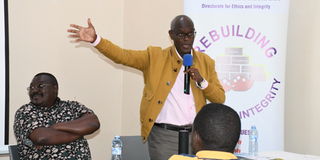Set harsher penalties for corrupt officials – leaders

The director of religious affairs in the Directorate of Ethics and Integrity, Rev Canon Aaron Mwesigye (right), addresses the stakeholders during an engagement on zero tolerance to corruption in Kabale last Friday. PHOTO/ROBERT MUHEREZA
What you need to know:
The leaders called for longer jail terms for those found engaging in the vice
A section of stakeholders in Kigezi Sub-region has asked Parliament to introduce stringent punishments to curb corruption.
The leaders said corruption laws should be amended to make it a capital offence for whoever is implicated in any corruption offences.
They made the remarks at a one-day engagement on zero tolerance to corruption organised by the Directorate of Ethics and Integrity in Kabale Town last Friday.
Mr Godfrey Nyakahuma, the Kabale Resident District Commissioner, said: “Poor legislation is responsible for the increasing corruption tendencies in Uganda. It’s our appeal that the Members of Parliament enact a law listing corruption among the capital offences in the country so as to make it more risky for the intending offenders.”
He added: “As long as corruption remains a simple crime that attracts only 14 years as maximum sentence and the related privileges of police bond and court bail, corruption will remain a cancer in our country.”
The executive director of Kick Corruption Out of Uganda, a non-governmental organisation in Kigezi Sub-region, Mr Robert Byamugisha Kakuru, urged the Ministry of Education to include lessons on corruption in the curriculum for primary and secondary schools to prepare students early enough to fight the vice.
“Fighting corruption is now risky in Uganda because personally I have been arrested several times by security agencies every time I try to investigate and expose the corrupt government officials in Kigezi Sub-region. We need protection from the government as we supplement its role of fighting corruption in our country,” Mr Kakury Byamugisha said.
The principal assistant secretary for Rubanda District, Mr Elly Mucunguzi, appealed to the government to deploy magistrates and state prosecutors in the newly created districts as a way of bringing judicial services nearer to the people so that corruption and abuse of authority cases are handled in a timely manner.
“Police files delay to be sanctioned because the state prosecutors stay in Kabale District. We have allocated a piece of land at the district headquarters where a building to accommodate the required judicial officials can be constructed and we are waiting for a response from the central government,” Mr Mucunguzi said.
Media activists blamed the government for promoting corruption by protecting culprits.
“How could the government drop charges of corruption and abuse of authority against ministers who [admitted that they diverted] iron sheets meant for the vulnerable people in Karamoja region?” Mr Donatus Eguma, a media activist, said.
“If President Museveni does not take political action as he promised against the accused ministers, then Ugandans will never take him seriously in fighting corruption,” he added.
The director of religious affairs in the Directorate of Ethics and Integrity, Rev Canon Aaron Mwesigye, said: “Religious leaders and the media in Uganda occupy space which they must use to fight corruption. While the media can use their pens and paper to expose the corrupt, the religious leaders have a role to pray to God to end corruption the fact that corruption is in the hearts and minds of the corrupt. It’s you and me to stand up and fight corruption since we are co-creators of God.”




